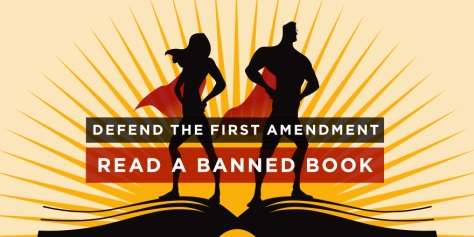
When a patron comes to your library, upset about a book or some of your materials – are you prepared with an answer? It can be hard for you to respond quickly unless you have a policy and are comfortable with the procedure for working with patrons who challenge your materials. Fortunately, in our profession, we have several resources available to help you to respond well to patrons!
As a profession, one of our core values is Intellectual Freedom. “We uphold the principles of intellectual freedom and resist all efforts to censor library resources. ALA Policy Manual, B.9.16 (Old Number 54.16) ( ALA Code of Ethics, Article II)” We believe in providing information to the community, and letting them make choices about their consumption of it. In our Code of Ethics from the American Library Association, this same sentence is Statement Two. Our profession believes in protecting people’s right to choose material, not to restrict it.
Your library needs a policy for this issue, and also to have some training for everyone on their role in challenges. A patron may come to anyone in the building to start a challenge, so everyone needs to know how to either proceed with it or who to pass the patron to for better assistance.
All types of libraries can receive challenges to their materials, so everyone needs to be ready to respond in the best way. The ALA has a set of strategies here, for any library to use in preparing a policy and starting some staff training. There are good tips on effective communication styles, both for the patron in person and when dealing with the media.
It is important to take seriously the concerns community members bring to your attention. Creating and following a procedure can help to assure patrons that you are respecting their rights to share their opinions and to voice their concerns.
As you begin to write your policy, or to do the regular edits necessary for policies, you may find this information helpful from the ALA. They discuss some justification for having a policy, then help you to walk through the basic format of a policy with information you may want to include. Every library is different in focus and in the community it serves; so all policies will need to have different language and information to make them fit your needs. If you have a challenge hearing, some steps on the procedure are given to be sure you are thinking through this process before a need for it arises.
While each library is different, it can be helpful for you to look at the policies other libraries have created. These are often included with their Collection Development polices, as potentially controversial materials are not collected just to be controversial, but because they are adding to the overall collection. Here is an example from the Pikes Peak Library District. This site gives you some specific information on collection development, including sample policies, for school libraries. And here is a Prezi presentation on reconsideration of library materials policies for school libraries. Here is a policy from the University of South Carolina; scroll down to the “Intellectual Freedom” section for the challenged material sample.
Part of your process may include education for your community on the rationale for including controversial materials in your collection. This is some material from the National Council of English Teachers, discussing some reasoning for teaching challenged materials. There are also other links on this page to give you some information and ideas about providing materials that may be challenged.
Handling a materials challenge can be hard: you want to do the right thing for the patron, for your library, and for the profession. It is a lot to balance! But you do not have to do it alone. The resources from the ALA are here, and there are more on these sites linked above. And the CMLE is available to help member libraries as you create and revise policies, or to help with training for your staff to help everyone feel more comfortable with this topic – and ready to handle challenges well!
